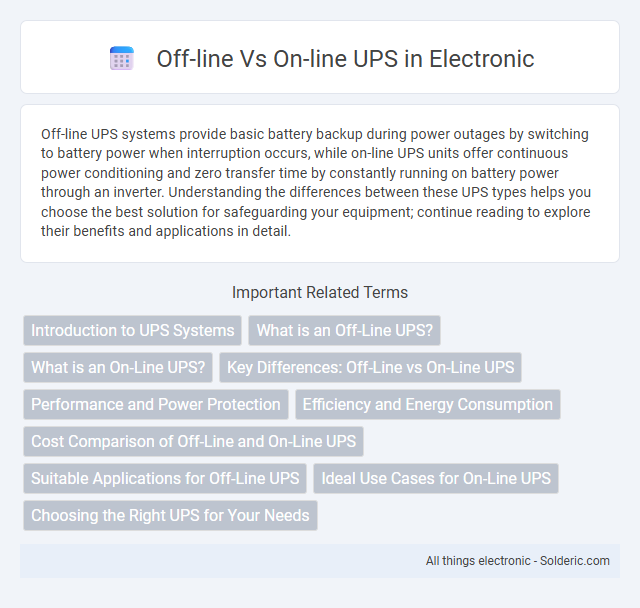Off-line UPS systems provide basic battery backup during power outages by switching to battery power when interruption occurs, while on-line UPS units offer continuous power conditioning and zero transfer time by constantly running on battery power through an inverter. Understanding the differences between these UPS types helps you choose the best solution for safeguarding your equipment; continue reading to explore their benefits and applications in detail.
Comparison Table
| Feature | Off-line UPS (Standby UPS) | On-line UPS (Double Conversion UPS) |
|---|---|---|
| Power Source | Utility power with battery backup | Continuous battery power via double conversion |
| Switching Time | 2-10 milliseconds | 0 milliseconds (no transfer time) |
| Power Quality | Basic protection, limited voltage regulation | High-quality, clean and stable output |
| Ideal Use | Home computers, small office electronics | Critical servers, data centers, medical equipment |
| Cost | Lower upfront and maintenance costs | Higher initial and operational costs |
| Efficiency | Higher efficiency during normal operation | Lower efficiency due to continuous double conversion |
| Maintenance | Less complex, easier to maintain | More complex, requires specialized maintenance |
| Battery Usage | Battery charges during normal power, used on outage | Battery constantly powers load via inverter |
Introduction to UPS Systems
Uninterruptible Power Supply (UPS) systems protect your electronic devices from power outages and voltage fluctuations by providing backup power. Offline UPS systems operate by supplying power directly from the mains and switch to battery only during outages, making them suitable for basic protection needs. Online UPS systems continuously convert incoming power to DC and back to AC, offering seamless, high-quality power ideal for sensitive or critical equipment.
What is an Off-Line UPS?
An Off-Line UPS, also known as a standby UPS, provides basic power protection by delivering utility power directly to your devices while switching to battery backup only during power outages or voltage fluctuations. It is ideal for less critical applications requiring minimal sensitivity to power interruptions, offering a simpler, cost-effective solution compared to On-Line UPS systems that provide continuous, clean power through double conversion. Your choice of an Off-Line UPS suits environments where brief transfer times and limited power conditioning are acceptable.
What is an On-Line UPS?
An On-Line UPS (Uninterruptible Power Supply) continuously provides power by converting incoming AC to DC and then back to AC, ensuring zero transfer time during power disruptions. This design offers superior protection for sensitive equipment by maintaining a clean, stable output voltage and isolating devices from power irregularities. Your critical systems benefit from uninterrupted operation and enhanced reliability with an On-Line UPS compared to off-line models.
Key Differences: Off-Line vs On-Line UPS
Off-line UPS systems provide basic battery backup by switching to power during outages, ideal for low-power devices and cost-effective solutions. On-line UPS continuously powers connected equipment through its inverter, ensuring zero transfer time and consistent voltage with advanced surge protection, suitable for critical and high-demand applications. Your choice depends on the level of power reliability and protection required for your equipment.
Performance and Power Protection
Off-line UPS systems offer basic power protection by providing battery backup during outages but may experience brief transfer time delays that can affect sensitive equipment. On-line UPS systems ensure continuous power with zero transfer time, delivering superior voltage regulation and filtering, making them ideal for critical applications requiring high performance and reliable power protection. Your choice depends on the sensitivity of your devices and the level of uptime needed for optimal operation.
Efficiency and Energy Consumption
Offline UPS systems generally have lower efficiency as they continuously draw power even when the main supply is stable, leading to higher energy consumption. Online UPS units use double-conversion technology, providing near-perfect power quality with slightly higher energy usage due to constant inverter operation. Your choice affects overall energy costs, especially for critical systems requiring consistent power with minimal losses.
Cost Comparison of Off-Line and On-Line UPS
Off-line UPS systems generally have a lower initial cost and reduced operational expenses due to their simpler design and less energy consumption, making them ideal for small-scale or budget-sensitive applications. In contrast, on-line UPS units offer superior power conditioning and continuous power supply but come with significantly higher purchase prices and maintenance costs, reflecting their advanced technology and enhanced reliability. Organizations must balance upfront investment against long-term performance benefits when choosing between off-line and on-line UPS solutions.
Suitable Applications for Off-Line UPS
Off-line UPS systems are ideal for personal computers, small office equipment, and devices with non-critical power needs due to their cost-effectiveness and simple design. They provide basic surge protection and battery backup during power outages but have a transfer time that may not suit sensitive electronics. These UPS units are commonly used in home offices and small businesses where brief power interruptions can be tolerated.
Ideal Use Cases for On-Line UPS
On-line UPS systems provide continuous power from their inverter, making them ideal for sensitive equipment requiring zero transfer time and clean, stable power. Your critical applications such as data centers, medical equipment, and financial servers benefit from the uninterruptible and filter-protected power these systems deliver. This ensures maximum protection from power surges, outages, and electrical noise, maintaining optimal performance and preventing data loss or hardware damage.
Choosing the Right UPS for Your Needs
Choosing the right UPS for your needs depends on the level of power protection required and the sensitivity of your equipment. Offline UPS systems provide basic battery backup for short outages, suitable for less critical devices, while online UPS systems offer continuous power conditioning and zero transfer time, ideal for sensitive or critical equipment. You should evaluate your power stability, equipment importance, and budget to select the most effective UPS type.
off-line vs on-line UPS Infographic

 solderic.com
solderic.com